Peter MALONE
Saturday, 09 October 2021 13:00
breaking In/ 2018
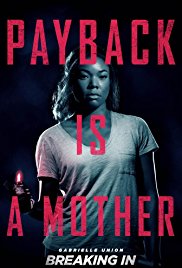
BREAKING IN
US, 2018, 88 minutes, Colour.
Gabrielle Union, Billy Burke, Richard Cabral, Ajiona Alexus, Levi Meadon, Seth Carr, Jason George.
Directed by James Mc Teigue.
The breaking in of the title refers to a home invasion. The film builds up tension as a mother with her children come to a home, are taken hostage by a vicious gang searching for money in the house.
The mother uses her ingenuity, as do the children, especially the older daughter.
There are also complexities in the plot, the background of the money stashed in the house.
The film was directed by James Mc Teigue who made a number of action films including V for Vendetta.
1. A home invasion story, response of the family, the response of the mother? Outwitting the criminals?
2. The city, joggers, the car accident, the murder? The American countryside, the holiday home? The woods? The interiors of the home, luxury, IT and surveillance, gadgets? The musical score?
3. The situation, the dead man, criminal background, the holiday home, luxury, stashing money? His death? His daughter inheriting, the alienation from her father? Her husband, with the two children, the drive? Into the house, the discovery of all the gadgets, settling in?
4. The invaders, Eddie as the leader in brains, Peter and his being caught and Sean’s treatment, as hostage, Eddie shooting him? The young man, from prison, some compassion for the children? The psychotic criminal, his appearance, behaviour, confrontations, killing the visiting woman, the clash with Eddie and his death? Tormenting the children, confronting Sean? Her using his knife to defend herself?
5. The children, settling in, taken hostage? The daughter using her ingenuity, finding her mother, getting the information, the safe? Protecting her brother, cutting herself free? The escapes, in the car with their mother, the crash? The eventual escape? The father’s arriving, unsuspecting, his being brutalised, the going to his help?
6. The focus of the film on Sean, her courage, schools, using the IT, the music, on the roof, using Peter as a bargaining chip? The car, the escape? Her being brutalised, her husband and warning him? The current children? The continued danger, her final vindication?
7. Audience identification with Sean and her family, hostile response to the criminals?
Published in Movie Reviews
Published in
Movie Reviews
Saturday, 09 October 2021 13:00
Deadwood
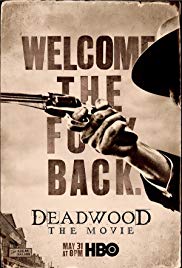
DEADWOOD
US, 2019, 110 minutes, Colour.
Ian Mc Shane, Molly Parker, Timothy Olyphant, Kim Dickens, Brad Dourif, Anna Gunn, John Hawkes, Robin Weigert, Gerald Mc Raney.
Directed by Daniel Minahan.
Deadwood was a very popular series on television for several years. This television movie come several years after the popularity of the series, brings together the main cast and characters.
Deadwood is associated with Calamity Jane – and she makes an appearance in this story. However, the focus is on Ian Mc Shane as the proprietor of the local saloon and Timothy Olyphant as the marshall. The film includes quite a number of character actors reprising their roles.
The dialogue of the film is a strange mixture of 19th century English and 21st-century swearing.
While the film uses many of the conventions of Western plots, there is also a critique of politics, land grabbing and social unrest in the later part of the 19th century.
While the film can stand on its own for audiences, it is mainly geared to those familiar with the television series and who want more.
1. The popularity of the television series, the seasons? The characters, situations, the American West? Considered a classic
2. The finale, feature length film? The characters, the situation in Deadwood, past threads brought together, the central character and his death, the Marshall and his wife and family, the future of the town?
3. The elaborate set, the streets, hotels, interiors? The streets, processions and confrontations?
4. The screenplay, the use of 19th-century English – and the prolific (excessive?) use of 20th-21st-century swearing? The blend of anachronisms?
5. Audience familiarity with the characters? Ian Mc Shane as Al? Look, manner, his establishment, ownership, management? His drinking, the doctor? Confined to his room? On the balcony observing? Trixie, the attack on the senator? His concern, her being pregnant? The wedding? Observing the confrontation with the senator? His death – and the final words of the film spurning God?
6. The Marshall, his role in the town, the past relationship with Alma, the flashback, her arriving to work for the bank, her daughter, her role in the option, buying the land? The Marshall, his wife and family? His friendship with Al? The concern about Charlie, the senator and the land, Charlie’s death, Sam as witness, in the jail, his being bashed, almost lynched? The senator, the accusations, the arrest, allowing the senator to be bashed? His going home to his family?
7. Trixie, her past, the attack on the senator, pregnancy, going out on the balcony, shouting, giving birth, the delight in the child? Her relationship with Saul? Al and his protection? The senator wanting her arrested? Preparation for the wedding, the Jewish component, the ceremony, everybody attending, the celebration afterwards, the intrusion by the senator?
8. Calamity Jane, her reputation, older, tough, relationship with the women, the prostitutes, the reconciliation? With the gun, in the town, shooting?
9. The girls, the brothel, in the bar?
10. The doctor, his role in the town, warning Al about his health?
11. The senator, from Deadwood, going to California, land grabs, the lumber for the communication poles? The procession, his defiance, Trixie’s attack? His thugs, his talking with Charlie, Charlie’s refusal to sell, his being murdered, the funeral? In his hotel room, getting the sheriffs from the next town, the confrontation, the Marshall taking his stand, the
arrest, Calamity Jane shooting? His being bashed by the townspeople?
12. The American West, the 1880s, transitions, more law and order, the future and Telegraph, phones?
13. The transition to the 20th century in the American West?
14. The strong use of Waltzing Matilda – before it was written!
Published in Movie Reviews
Published in
Movie Reviews
Saturday, 09 October 2021 13:00
Destination Wedding
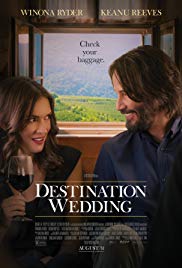
DESTINATION WEDDING
US, 2017, 82 minutes, Colour.
Winona Ryder, Keanu Reeves.
Directed by Victor Levin.
Destination Wedding is a two-hander, an opportunity for Winona Ryder and Keanu Reeves to play off each other. And, play off each other they do.
They meet at an airport, some conflict about pushing in in queues, seats on a plane, general hostility between the two. They are attending the same wedding and it emerges that Keanu Reeves plays the groom’s brother. The groom was also the former fiance of Winona Ryder.
Throughout the brief running time, they continue to fight with each other, verbal and emotional battles. They are reluctant to attend all the details of the wedding and spend a lot of time with each other, eventually some kind of connection, sharing of opinions, attraction.
The screenplay seems to indicate that there will be some further contact after the wedding.
1. The title, this kind of marriage-event in the United States? Guests, exotic destination, travel? The program, participation? The return?
2. Los Angeles, Santa Barbara, airports, flights, the town itself, the wedding, restaurants? The final apartments? The musical score?
3. A film of irony, parody, the tone of the captions explaining what was happening?
4. The stars, their working together in the past, now in middle age?
5. The brevity of the film, the strength of the dialogue, sardonic and ironic, the wit, enabling the couple to spar, there are ups and downs, criticisms of each other?
6. Meeting at the airport, the cheating and getting ahead in the line, the small plane, the seats, wine spilt? Picked up at the airport, as guests, their rooms, the meals together, their observing and critical conversation? The past, the engagement, the half-brother of the groom? Their bitter memories, caustic comments?
7. Their jaundiced views of the world, of life, of relationships? Their arguments? Scoring off each other? The cumulated effect of this banter? The sexual encounter?
8. Each of their reactions to the sexual encounter, she romantic, he sardonic? Raising of the possibilities, his rejection?
9. The wedding, the aftermath, leaving, promising never to see each other again? At the airport? The plane ride?
10. The departure and separation at the airport, the after-effect on each of them, his knocking on her door…?
Published in Movie Reviews
Published in
Movie Reviews
Saturday, 09 October 2021 13:00
Jonas/ I Am Jonas
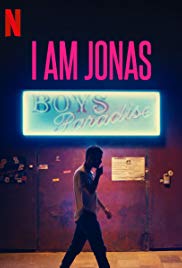
JONAS/I AM JONAS
France, 2018, 82 minutes, Colour.
Felix Maritaud, Nicolas Bauwens, Tommy- Lee Baik, Aure Aticka, Ilian Bergala.
Directed by Christophe Charrier.
This is an arresting drama, focusing on Jonas, firstly as an adolescent at school, then as a hospital worker in his early 30s. There are strong performances by the two actors who play Jonas, Felix Maritaud as the older, Nicolas Bauwens as the younger. The screenplay moves between each era, sequences commenting on the other, the audience getting to understand each of the personas of Jonas better.
The young Jonas lives at home, 1997, his father watching television about the death of Princess Diana. He has a friend at school though he is rather isolated. A fellow student arrives at school and Jonas is intrigued and attracted, the new student being bold and anti-authority, Jonas falling in love with him.
The older Jonas is something of a wreck. He works in a hospital and is kind to patients and visitors. He is active in his homosexual life, violent and drinking and collapsing, but takes an interest in a particular young man, following him.
The complexity is that the young man is the younger brother of the student he fell in love with – and there are flashbacks to the two young men going to the gay club in the town, refused entry, picked up by an older man who drives away, Jonas anxious, causing the car to crash – and his friend never seen again.
This means conflicts between Jonas and the younger brother and meeting with their mother whom he had known in the past.
A film exploring gay orientation, psychology, and some tragic consequences.
1. The title, the focus on Jonas, as an adolescent at school, in his 30s, working in the hospital, a seemingly aimless life?
2. The setting, the town, home, school, hospital, beachfront? Familiar? The musical score?
3. The two time periods, introducing Jonas as adolescent, the transition to adult, the intercutting between the two periods, the thematic connections, memories, regrets?
4. Jonas adolescent, in the car, the Game Boy, the threatening apparition and its meaning? Reassured by his father? At home, 1997, the father watching the Princess Diana news? His mother supporting him? At school, no friends, memories of breaking up with a friend and not contacting him? The principal and the class, Caroline, his rejection of her in the classroom for Nathan? The attraction to Nathan? Talking, the gossip of the other boys, Nathan fainting, going to the gym, Nathan’s talk about abuse by the priests, later revealing he had made it up and not thought he would be believed? The gift of the Game Boy and Jonas treasuring it, Leonard later tossing it into the pool, finally in Jonas leaving it behind? The sexual attraction? The abusive boy, the cigarettes, Nathan making him sick? Going to Nathan’s house, his mother welcoming them, the swimming pool? The outings with Nathan, going to the gay club, not being let in, the man picking them up, Jonas and his apprehension, stopping the car, getting out, Nathan injured, the man driving off, Nathan never heard of again? The police interrogation, the family interrogation, Nathan ashamed because he did not help and got out of the car? The effect on him?
5. Jonas as adult, his appearance, clothes, bike, going to the gay club, dancing, fighting, the police picking him up, meeting Caroline again, the interrogation? His dependence on his parents, but their being absent? His work at the hospital, the old man in his operation, comforting the wife? Going to the beach, stalking Leonard and his girlfriend? Going to the hotel, the encounter with Leonard, smoking in his room, the water, Leonard knowing who he was? Going to the club, Jonas collapsing, brought home? Meeting Nathan’s mother after 17 years, her being upset, Leonard accusing him? Nathan and his memories, driving with Leonard, suspecting that Nathan was dead?
6. How convincing was the transition from the adolescent Jonas to the adult Jonas, his decline? A psychologically interesting film about a gay man, transition, decline, guilt haunting him?
Published in Movie Reviews
Published in
Movie Reviews
Saturday, 09 October 2021 13:00
Bilched
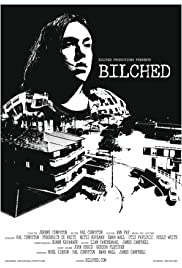
BILCHED
Australia, 2019, 98 minutes, Colour.
Hal Cumpston, Frederick Du Rietz, Mitzi Ruhlmann, Ewan Wall, Otis Pavlovic, River Cumpston, Holly White, Nicholas Bakopoulos- Cooke.
Directed by Jeremy Cumpston.
This is one of those slices of life films, a focus on teenagers and their problems, the raucous aspects of their lifestyle, the possibilities for some to move out of this life while others are stuck in it.
The film is something of a family affair for the Cumpston’s, the film having been written by Hal Cumpston, aged 18, drawing on his own life and reflections, other members of his family portraying teenagers, and the film being directed by his father, Jeremy Cumpston. It has the support of some veterans, including Jeremy Sims as one boy’s father and has a producer on the film, along with Malcolm Kennard in the role of the teacher.
The film is set in the eastern suburbs of Sydney, especially the beach suburbs and on the beachfront. There is quite a mixture of ethnic families in the area, from Europe, from New Zealand, from the Pacific, from Africa.
The plot is familiar. The students in the final year are preparing for leaving, some with prospects, others with very few prospects. Hal, in fact, wants to be an actor and is seen early in the film in an audition. And the film ends with his friends encouraging hell to go to the second edition when he gets a call back, performing effectively, obviously accepted by the panel auditioning him.
How has some younger brothers, one becoming sexually involved with a girl from a more affluent background in school, another one getting into trouble with a friend, both age 12, going to the movies, getting lost, stealing bikes and getting into trouble with other students from more affluent schools.
The language in the film is fairly constant in its bluntness and crudity, insisting that this is what these characters talk like in real life.
On the whole, the adult generation and parents are absent from the action, mentioned but really seen.
Howl has a great liking for a girl that he knew from primary days, meeting her, talking with her, but her interpreting his behaviour in a negative way. Howl also has encounters with a girl from a private school, her father very wealthy, her mother having a breakdown, hiding a boy in her room from her father, clashing with howl and taking strong feminist stances which she challenges. Towards the end of the film they have a rather more interesting discussion about the issues, more understanding and excepting.
There are strong friendships within the group, a lot of peer company, antagonism (including throwing eggs) at boys from a superior private school.
In the latter part of the film, time is taken up with partying, a lot of drinking, some drugs, sexual encounters. In looking at this part of the film, the audience will think that these young men and women have very little aim in life, very little moral anchoring. And, in the vein of many similar American comedies, younger audiences take this as patterns for way of living, as if there is no tomorrow.
Often a very frank film in its characters, details of their communication, self-centredness, pleasure-oriented, strengths and weaknesses in friendships and relationships?
Published in Movie Reviews
Published in
Movie Reviews
Saturday, 09 October 2021 13:00
And Then We Danced
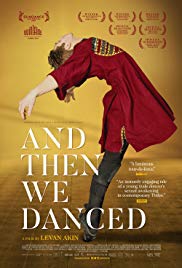
AND THEN WE DANCED
Georgia, 2019, 113 minutes, Colour.
Levan Gelbakhiani, Bachi Valishvili, Ana Javakishvili, Kakha Gogidze'
Directed by Levan Akin.
World audiences do not see many films from Georgia, capital Tblisi. This film has received rather wider circulation and awards at festivals.
As the title indicates, there is a focus on dance. Much of the action here takes place in a dance school in Tblisi, centring on one of the young trainees, Marek (Levan Gelbakhiani), who comes from a dancing family, especially his father who is now a businessman. His brother also studies at the school.
Audiences are less familiar with dancing styles and traditions from central and eastern Europe and will find the rehearsal and performance scenes rather different. Many of them are accompanied by a beating drum, having strong steps, intense physical movement. There is an explanation that this is traditional dancing but has been consolidated during the era of the Soviet Union. The dance has become very masculine, suspicions of any softening, any feminine influence, even with the number of female dancers.
With these aspects, and details of life in the capital, family life and apartments, the role of the older generation, especially the women keeping house and cooking as well as loving support, the expectations of the men to be strong and supportive, the film is an invitation to another world. However, with 21st century changes in social communication, media,, there is much more relaxation in the attitudes and’s lifestyles of the younger generations. (And all of them smoke – all the time!).
Marek is not the most successful of dancers continually criticised by the dance instructor and supervisors. The instructors do not look like dancers but resemble the stereotype of police and secret agents.
Marek dances with one of the young women at the school, friends from their childhood. However, a new, somewhat older, dancer from outside the city, full of self-confidence, take his place in the school and Marek is fascinated.
And so, the film explores themes of sexual orientation, Marek and his understanding himself, acknowledging himself, although his interactions with the newcomer are concealed from the others. There is gossip that another of the dancers, forced out of the closet, has given up his dancing and has become a male prostitute. The culture is homophobic.
And yet, Marek is determined to succeed, despite the criticisms, despite the emotional involvement as well as disappointment at rejection. He goes downhill, self-absorbed, experimenting in drink and sexual behaviour? Though he injures his ankle at rehearsal, he is determined to go to the final audition, persevering the falling, ever more determined to succeed, the final image of him defiant.
The film has interest in terms of Eastern European dance and its traditions and style. It is also an Eastern European exploration of homosexuality and the effect of coming out in Georgian society.
1. A film from Georgia? George and characters, situations, stories? How universal?
2. The setting into blue sea, the dance school, the interiors? Homes, courtyards? Streets, clubs? The countryside?
3. The musical score, traditional music, drums and percussion, the range of songs?
4. The title, tense? Traditional Georgian styles, from the past, the changes during the Soviet period and the consequences? Expectations of dance, performance, of the dances, the instructors, echoes of bureaucracy and strict control?
5. The dancing, the rehearsals, the demands on the dances, the atmosphere for the auditions, men and women, the dancing partners, the spirits, the discipline?
6. Marian’s story? His age, the family, the traditions of dance, his brother also a dancer? The father and his work? The mother at home, the grandmother? David and his being unreliable? The home scenes? Marian and his being self-contained? The friendship with Maria, expectations of their partnership? The rehearsals, his hopes, preparation for the audition, criticisms by the instructor?
7. The arrival of the killer, self-confident, his hearing and its having to be removed, his skill in dancing, his been chosen for particular dances? His story, from the country, his sick father, his girlfriend at home? His age?
8. The range of older women, mothers and grandmothers, neighbours, working in the house?
9. The younger women, more freedom, dancing, parties and partnerships, condom is a sex? Oh and her being pregnant to David?
10. The amount of drinking on the part of the younger people? The enormous amount of smoking?
11. Mari and, his appearance, home life, personality, smoking? The attraction towards the killer, gradual, sharing, talking, comfortable together, going to the countryside, the sleep, the masturbation, the effect, the later sexual encounter? The consequences for each? The possibilities for the future?
12. The story is ours, the dancer, homosexual, his being arrested, going on the streets? Marian on the bus, going to the clubs, the types, the frenzy, the drinking, searching from for it killer?
13. Marie Benders dependence, trying to perfect his dance, his fall, his ankle, Maria helping him, questioning him, his being critical of her?
14. David, older, the drugs, dealing, his being ousted from the dance school, wanting the job, getting married to help him, his being fired? So proactive pregnancy? On, the
family, marriage, the ceremony, the guests are the dancing? Married, it killer present, avoiding each other, the blunt talk, the engagement and it killer is returning home?
15. Married, his injury, his determination for the audition, Maria in the Gallery watching? His determination, the range of dancing, the bureaucrat and his leaving, the instructor and his allowing merit to continue? Marian walking out the door, the freeze-frame – and his future? Maria and her support, weeping?
16. The audition, its effect, married falling, getting up again, making the dance floor feminine, effeminate, contrary to the masculine traditions and expectations? His future, in Georgia, leaving?
Published in Movie Reviews
Published in
Movie Reviews
Saturday, 09 October 2021 13:00
Last Thing He Wanted, The
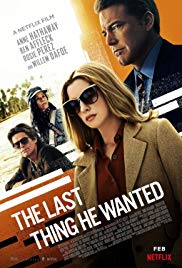
THE LAST THING HE WANTED
US, 2020, 115 minutes, Colour.
Anne Hathaway, Ben Affleck, Willem Dafoe, Rosie Peres, Edi Gathegi, Mel Rodriguez, Toby Jones.
Directed by Dee Rees.
This drama has very high credentials. The cast is strong, has a number of character actors, is based on a book by celebrated author, Joan Didion, and is directed by Dee Rees who had great success with the challenging drama, Mudbound.
However, it was the subject of critical attack. And, many audiences will identify with the criticism.
There are sequences in Central America around 1980, violence and uprisings, reporters having to get out of the country. There are also sequences in 1984 with reporting on the election and the re-election of Ronald Reagan and its consequences for American policy towards Central America. There is a critique of government officials and their advisors. The latter part of the film concerns gunrunning schemes to Central America, government involvement, criminal involvement.
The criticism of the film is that it is very confused in its presentation of its themes. Which is confusing for audiences.
Anne Hathaway has the role of a tough journalist, alienated from her father, Willem Dafoe, but making connection with him especially in the gunrunning. Ben Affleck is a political adviser, the blend of the charming and the sinister and the seductive. Rosie Peres is a journalist. Toby Jones is the proprietor of a Central American resort.
Perhaps there is too much plot.
1. The title? The book by Joan Gideon and its scope? Who is the Heel of the title? Elaine’s father? Morrison?
2. The critics severity on the film? The plot, performance, confusion of plot and issues?
3. Lena’s story, and Hathaway’s performance, her relationship with her parents, the father leaving, contact with her mother? The differing relationships? Her marriage, divorce, bringing up her daughter? The continued contact with her at school? Who work as a journalist, journalism and adventure, her experiences in Latin America, her friendship with Alma? Working together? El Salvador? The return to Washington, the Reagan election? Contact with politicians, direct questions? The arms story and the involvement of her father? Her becoming involved herself, the dangers? Arms in Latin America in the 1980s? Having to cover, the relationship was Morrison, her death?
4. The work in Washington, the office, the 1984 election, Reagan and his policies, Latin America? Press conferences, the officials, the advisers? Resentment towards Elena? Morrison and his role, the advice, the atmosphere?
5. The experience of El Salvador, the violence, cover, having to get out of the country?
6. Alma, her relationship, her work in the office, stories, supplying information for Elena?
7. Contact from her father, the puzzle about him, the arms deals, the 80s, Reagan, contacts and contracts? The range of types involved in the illegal arms imports?
8. Morrison, his role in government, advice, control, interest in Elena, the relationship with the arms deals? His presence, sinister, the sexual relationship? His stances, killing a Lena?
9. Paul Schuster, his background, gay bars, refuge in Latin America, his lifestyle, welcoming him Elena, her work for him, the cover? His being murdered?
10. The range of plot details and interconnections, characters? The criticism of the film as being confusing and with too many characters and situations?
Published in Movie Reviews
Published in
Movie Reviews
Saturday, 09 October 2021 13:00
Elizabeth of Ladymead
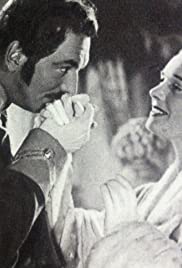
ELIZABETH OF LADYMEAD
UK, 1948, 97 minutes, Colour.
Anna Neagle, Hugh Williams, Isabel Jeans, Michael Lawrence, Bernard Lee, Nicholas Phipps, Michael Shepley, Hilda Bayley, Henry Edwards, Jean Anderson.
Directed by Herbert Wilcox.
The title sounds very ladylike. And, by and large, so is the film. It is a star vehicle for Anna Neagle and her husband, producer-director Herbert Wilcox. Wilcox had been directing films from the silent era, wide-ranging in their tone and themes. During the 1930s he made a number of films with Anna Neagle and this continued when they went to the United States in the early 40s. They married. Perhaps their heyday was in the immediate after-war period, especially with the very popular musical dramas with Anna Neagle and Michael Wilding, Picadilly Incident, Spring in Park Lane…
This film comes from that period and has a more than a touch of year olde English filmmaking.
However, the themes of the film are rather challenging, a critique of the attitudes of husbands returning from war, caught up in those situations, not realising that while they have been away, their wives had to take on great responsibilities and are eager to develop themselves. The men seem quite insensitive.
And this is illustrated in for periods, beginning with the contemporary period with audiences identifying with the situations and the aspirations of the women. Anna Neagle plays each wife – with colourful costumes and decor and music. There are flashbacks to the Crimean War, Nicholas Phipps being a particularly insensitive husband. Then there is the aftermath of the Boer War with Bernard Lee also insensitive. The pattern is somewhat broken with the aftermath of World War one, the wife this time being a flapper, more concerned about her having a good time than concern about her husband.
Returning to the contemporary story, there is a happier ending, the wife persuading her husband to return to politics and her collaboration with him, reminiscing about the historical characters while he speaks, accepting the challenge to women with their ambitions and with their responsibilities.
So, the same story in four guises.
1. A film of 1948? Old style British film making of the 1930s and 40s? The films of Anna Neagle and Herbert Wilcox? The contrast in contents, the critique of men returning from war and not understanding their wives, the wives and their experience during the war and the need for further development and possibilities in their lives?
2. Introduction post-World War II, Liz, the mansion, the servants, getting dressed, going to the airport, meeting John, joy after five years? Her reaction to his wanting to stay at home, withdraw from politics? The contrast with her hopes after doing the small things during the war? Her mother staying at the house, her influence? The discussion about selling the house, going to London? John and his determination? The visit by Major Wrigley, their talking about the war, Wrigley as intrusive, Liz upset and leaving? The argument, her walking into the mirror?
3. The structure of the film with the flashbacks? Costumes and decor for the period? Music and songs?
4. The repetition of the story in each era, the 19th century in the Crimean War? The Boer War? World War I? The husbands and their heroism, returning with honours, the effect of the war experience, their wives, their accomplishments in managing in the absence of their husbands, the testimonies from the servants and workers? The contrast with the flapper wife after World War I? The husbands, the reactions, becoming firmer, not comprehending their wives? And the intrusion of Major Wrigley in each era on the night of the return? Each period and the presence of the mother, the interventions of the mother, incomprehension about their daughter’s behaviour?
5. The Crimean War, the reception, the glamour, costumes and style, the music, John wanting Beth to play the piano and Greensleeves? Beth and her self-assertion, her disappointment in John, the intrusion of Major Wrigley? The portrait of John, his speeches, his pomposity, the role of women, the destiny of women, subservient to men? Beth and
her reaction?
6. The Boer War, the beginning of the 20th century, uniforms, dresses, style? The lower key return compared with the Crimean war? But the same scenario, Elizabeth, her strength of character, managing while her husband was away? His personality, the repetition of the other husbands, his angers, demands on his wife, her involvement with groups of women, the era of the suffragettes, her decision to go to the meeting rather than stay at home? John and his intransigence?
7. The contrast with 1919, John returning home, rather quietly, the telegram, Betty ignoring it, at the club, New Year’s Eve, the singing and dancing, the drinking? Her relationship with Wrigley, his avoiding the war and boasting about it, making uniforms and supply? The meeting between John and Betty, her costume, her talk, the flapper age, focused on herself, wanting a good time, the clash with John? His lack of comprehension, the clash with Wrigley and hitting him? Leaving Betty, killing himself? The consequences for her?
8. Post-World? War II, John and his going to Parliament, the dinner, his speech, Liz happy, her flashbacks while he was speaking, seeing each of the previous characters, their stances, especially Betty and the issue of taking responsibility?
9. The impact of this film in its time? The period of the Anna Neagle- Michael Wilding musicals? A contemporary and historical film? The critique of the men? The advancement of the cause of women?
Published in Movie Reviews
Published in
Movie Reviews
Saturday, 09 October 2021 13:00
Thoroughbreds
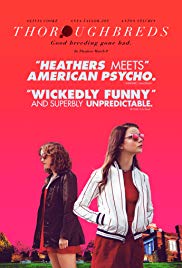
THOROUGHBREDS
US, 2017, 92 minutes, Colour.
Olivia Cooke, Anya Taylor- Joy, Anton Yeltchin, Paul Sparks, Francie Swift.
Directed by Corey Finley.
Surprisingly, a lot of American response to this film is to consider it a comedy. While there is a lot of irony in the film, what humour there is is rather black humour. This is even seen in the title, the reference to horses and the death of horses but also the metaphor further that the two young women, from affluent society and well educated, are thoroughbreds.
The film focuses on two young women, friends from early days, companions a school. One, Lily (a Taylor- Joy) combines with her friend, Amanda (Olivia Cooke), Amanda visiting the mansion home, their doing school work revision. However, Amanda reveals that she has been to psychologists, has no feelings, and is blunt in her analysis of Lily’s situation in her house, resenting her mother, even more hostile to her stepfather, who indulges in physical exercise and has photos of himself hunting.
Someone has commented that the two young women are the equivalent of American Psychos, an amoral plan to get rid of the stepfather, interrogating and hiring a young man who is ambitions of being a wealthy drug Lord in years to come (Anton Yelchin).
As might be expected, the plans do not turn out as anticipated. There is bloodshed. There is one friend framing the other. And Amanda being sent to an institution where she has dreams, writes to Lily who encounters the young man and reflects on the situation – and tells him that she has thrown Amanda’s letters away without reading them.
1. The title? The opening, Amanda and the knife, the horses? The metaphor of the horses, the two girls and their backgrounds, thoroughbreds? The further story about the killing of the horse?
2. The Connecticut setting, the mansion, the grounds, the interiors? Socials and parties? The town, the streets? The musical score?
3. The ironic tone of the film? Black humour? The girls as thoroughbreds, behaving like American Psychos?
4. The introduction to Amanda, visiting the house, curious, the past friendship with Lily? The awkwardness of their meeting, their studies, Amanda being paid? The background of the mothers and their concerns? The girls, their age, their past studies, the final photos of them with the horses?
5. Amanda revealing her character, psychologist, various diagnoses, schizoid? Her explanation of her not feeling? Her treatment of Lily? The studies, interrupting, diagnosing Lily, especially in her resentment of Mark? In her attitudes towards her mother?
6. Lily, her age, wealth, her mother and her self-centredness, her resentment against Mark? The discussions with Amanda? The studies, issues of money? Her holding her feelings inside? Amanda gradually getting her to open up, be honest, her hatred of Mark, the prospect of harming him, killing him?
7. Going to the party, the encounter with Tim, his manner, dominating, suspicious? The girls going to him about the killing? The discussions, his boasting about his future and drug dealing? The gun? The girls turning table on him, hitting with the lamp, in the bath? The meetings, the planning of the killing? His not turning up?
8. The girls, determination, Amanda forthright, Lily prim?
9. Mark, his arrival, attitude towards Amanda? The background of his exercise, hunting, the photos? His severity towards his wife?
10. The night, the discussion about the horses and the killing? Lily drugging Amanda? Killing Mark with the knife, returning, with so much blood on her arms, smearing it on
Amanda’s clothes? Lying on her for comfort?
11. The aftermath, Lily and her self-possession, the encounter with Tim and discussions with him? Talking about the letters from Amanda, her dreams, going to the institution? Lily throwing her letters away?
12. A contemporary morality/immorality/and morality play?
Published in Movie Reviews
Published in
Movie Reviews
Saturday, 09 October 2021 13:00
Every Time I Die
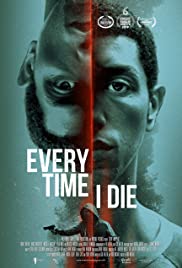
EVERY TIME I DIE
US, 2019, 97 minutes, Colour.
Mark Menchaca, Michelle Macedo, Melissa Macedo, Drew Fonteiro, Tyler Dash Fleming.
Directed by Robi Michael.
Certainly an arresting title. And, in fact, the central character does die several times.
Drew Fonteiro plays Sam, a paramedic who begins an affair with the wife of a military man serving overseas. However, this is not straightforward and, Sam, without knowing how or why, makes transitions to different situations.
On the narrative level, there is a certain straightforwardness, his work with his partner, Jay (Mark Menchaca), and travelling to a holiday house with Jay and his wife, Mia, with whom is having the affair, and her husband Tyler. Strange things happen to him there – and he is videoed saying that he killed his sister.
There are many flashbacks to Sam’s childhood with his sister, with his loving parents, a box of photos of himself and his sister, the memory of her wanting to take a photo of the lake, his pulling of the camera, her falling into the lake, recovered but dying in hospital. Sam has said that he tried to save her. His parents are supportive.
But, it would seem, that he is haunted by this experience, becoming something of a mystery to himself.
And, as regards the deaths, there is something beyond the natural in his experiences, even travelling through a kind of cloud/tunnel with a light at the end and his occupying different bodies, the bodies of his friends. And, each of them dies, Sam dying each time, going through the tunnel, becoming more aware of himself and his relationship with his sister.
While some audiences may find the screenplay rather bewildering, is rather evocative and provocative in the mysteries of Sam, his personality, his strange experiences, his occupying different bodies – and his deaths.
1. The title? Arresting? Sam’s deaths and their consequences? The deaths in various characters?
2. The city settings, Sam’s apartment, meetings? The contrast with the countryside, the house, the woods, the water? Musical score?
3. The plot intrigues and audience reaction? Understanding? The focus on Sam, his relationship with Mia, Tyler coming back from active service, Sam and his first experience of love, his work as a paramedic, driving with Jay, Jay and Poppy? His going to the countryside? Sharing with his friends? This basic plotline?
4. Sam, Mia leaving, his looking in the mirror, the transformation?
5. Sam and his variety of experiences, waking up in different situations, the box of photos with his sister, his wanting to get rid of it, its continually reappearing? Sam and the
encounters with Mia? Her response to her husband’s returning? Secrecy of the relationship?
6. The flashbacks, Sam and his parents, with his sister, their bonding, the teddy bears, the photos, loving the family? The episode on the cliff? His sister with the camera, Sam pulling, her falling and drowning? His response, paralysis? His saying that he tried to save her? The returning to sequences in the hospital, the sister in intensive care, her mother present, the parents’ grief, their trying to help Sam?
7. At the country house, Sam and his experiences, going into the woods, Jay with the camera and Sam confessing to killing his sister? Tyler and his hostility?
8. Sam driving, Tyler following, the struggle, Sam’s death? The vision of the light at the end of the tunnel and its take him back to the past, probing his identity for him?
9. Sam entering into Jay, his communicating with the group, audience response to the appearances of Jay and yet his being Sam? Poppy and her puzzle? Sam trying to explain himself to the others, the hostility towards Tyler? Tyler and his becoming evermore crazed? Pursuing Jay, the room, threatening him with the gun, shooting him, making it look like suicide? The reaction of the women? Sam’s death and the light at the end of the tunnel?
10. Sam entering into Poppy, his interactions with Mia? Tyler, crazy? The gun, Mia getting in the car, driving to the countryside, to the water? Trying to save Mia? Tyler pursuing, Mia in the back of the utility, her foot caught in the rope, the pick and his stabbing Tyler? The crash, the water, Sam entering into Tyler, out of the car, freeing Mia, saving her?
11. Sam in the form of Tyler? And a final death?
12. The plausibility of the plot? The touch of the supernatural? Sam and his experiences, search for identity?
Published in Movie Reviews
Published in
Movie Reviews